Kathryn Mockler's Blog, page 36
April 17, 2023
My Pre-writing Freeze | Words Count
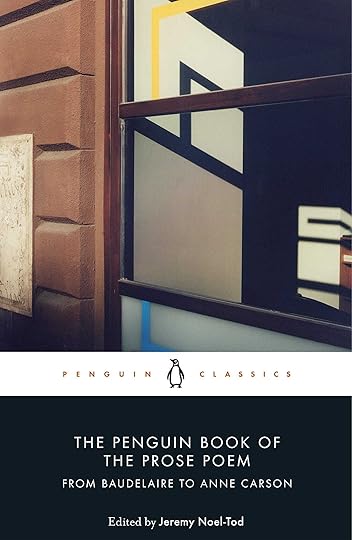
A couple of months ago I was invited to write a short fiction piece for an online journal. I happy agreed because I loved the project.
But when I sat down to work on something for it, I was gripped by my familiar and what I now call my pre-writing freeze. I wouldn’t call it writer’s block—although perhaps that’s what this is. It doesn’t quite feel as serious as writer’s block, but it certainly is annoying!
I just finished writing a book of short stories! I know logically that I can write something, but this always happens when I’m expected to write something.
My fix for this state is to recognize it and not freak out, and then do what I always do—read something that will get me excited about writing!
Last night I chose to read the Penguin Book of Prose Poetry (2019) which was just about the most perfect thing to read with its juxtaposition of voices and styles. Some prose poems were more prosaic, others more lyrical. Some of my favourite pieces include “Blue Dog” Luke Kennard, “Conversation About Home (at the Deportation Centre” by Warsen Shire, “Rape Joke” by Patricia Lockwood,” and excerpt from Citizen: An American Lyric by Claudia Rankine, an excerpt from The Weather by Lisa Robertson.
Anyway it’s a great anthology!
And, yes, I did get my story written too!
Kathryn Mockler’s debut story collections Anecdotes is forthcoming from Book*hug. Pre-order Anecdotes at your local bookstore.
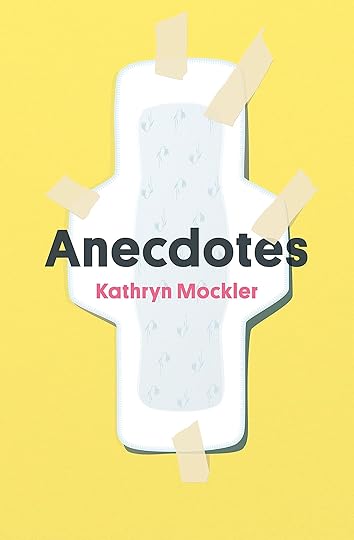 Support Send My Love to Anyone
Support Send My Love to AnyoneThis newsletter is free, but you can support it by signing up for a monthly or yearly subscription, liking this post, or sharing it!
Big heartfelt thanks to all of the subscribers and contributors who make this project possible!
ConnectTwitter | Instagram | @themockler | Archive | Contributors | Subscribe
April 12, 2023
An Itch
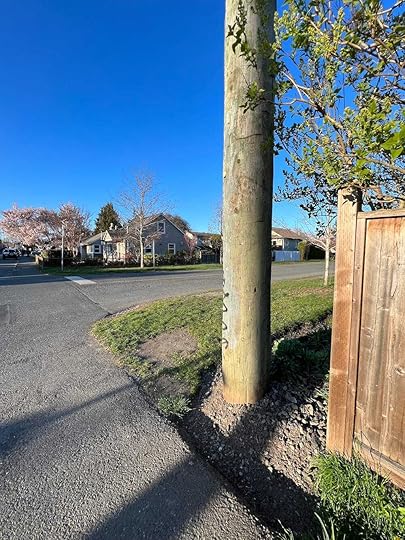
Will I ever stop embarrassing myself in public?
Probably not.
It’s spring in Victoria, the kind of weather where it’s not quite warm enough to give up a spring jacket entirely.
I’m walking to the university, which is about a 50-minute walk from my apartment. Fifteen minutes into the walk, my back gets sweaty under my jacket and heavy backpack.
An itch starts to form in the middle of my back where I absolutely cannot reach it with my coat on and likely would not be able to reach it with my coat off either.
I look around for somewhere to attend to the itch, which is increasing in severity with every second.
I spot a telephone pole and stand near it waiting while several cars pass so they won’t see me. When I think the coast is clear, I drop my backpack and lean my back on the pole and proceed to relieve the itch which is now actually painful in it’s intensity.
Closing my eyes, I continue to rub my back on the pole. As the itch dissipates, I moan in relief. There is nothing quite so pleasurable as relieving oneself of an uncomfortable itch.
Then I hear the jingle of a dog leash. I open my eyes and a few feet to my right a man and his dog are staring at me.
“I have an itchy back,” I say peeling myself off the pole.
“Yes, and you have many layers on,” he says helping me normalize my behavior.
“I was hoping no one would see me.”
He laughs kindly, and we go our separate ways.
Support Send My Love to AnyoneThis newsletter is free, but you can support it by signing up for a monthly or yearly subscription, liking this post, or sharing it!
Big heartfelt thanks to all of the subscribers and contributors who make this project possible!
ConnectTwitter | Instagram | @themockler | Archive | Contributors | Subscribe
April 2, 2023
On Shame, Grant Announcements, and Toxic Writing Friendships | Issue 26
I recently learned something about myself, and I’ve had one-eighty on a long held opinion.
During grant results season many people share whether they got grants, didn’t get grants, and their opinion on grant announcements.
For years, I held firm to the notion that grant announcements on social media were bad—even though I have engaged in every form of self-promotion out there, and I encourage and coach writers I work with to self-promote and use social media. And as publisher, I even get a little irritated when people don’t.
So why did I draw the line at grant announcements? I used to maintain that it was insensitive to writers in your feed who didn’t get grants that round.
But that same logic could be applied to any form of self-promotion or any kind of positive news. So if someone got rejected from a literary magazine or a publisher where you were accepted, should you avoid sharing your story to spare the feelings of all the people who didn’t get an acceptance?
No, of course not. That’s ridiculous, so why did I feel that way about grant announcements?
I was not opposed to grant announcements out of any sense of jealousy. I’ve received grants throughout my career and some have saved me during bleak financial times, but I’ve also had my share of rejections. I am neither jealous, nor resentful when someone else gets a grant, so why was I so strongly opposed to people sharing this on social media?
A few weeks ago, I wrote a tweet about grant announcements and how I thought it was insensitive to share grant news on social media, but something about my tweet didn’t sit right with me. I didn’t like my own take, but I wasn’t sure why. The tone was off. It felt like I shaming others, so I deleted it. But I was curious about my own response and kept thinking about it.
The next day, I saw other tweets about grant announcements on my feed. One by Alicia Elliot, stopped me in my tracks.
 Alicia Elliott @WordsandGuitarMaybe unpopular opinion, but I think it's great when writers post about grants they're awarded. Writing is often gruelling & solitary. We should celebrate our successes when and where we can. If seeing another writer succeed makes you angry/jealous, deal with it. You're an adult.4:41 PM ∙ Feb 24, 2023280Likes9Retweets
Alicia Elliott @WordsandGuitarMaybe unpopular opinion, but I think it's great when writers post about grants they're awarded. Writing is often gruelling & solitary. We should celebrate our successes when and where we can. If seeing another writer succeed makes you angry/jealous, deal with it. You're an adult.4:41 PM ∙ Feb 24, 2023280Likes9Retweets Alicia Elliott @WordsandGuitarChannel your emotions into making your work better, rant to your besties in a group chat, talk to a therapist if it gets real bad. But don't try to shame others into hiding their success and joy because you think it should have been yours. Bitterness is always obvious and ugly.4:45 PM ∙ Feb 24, 202348Likes1Retweet
Alicia Elliott @WordsandGuitarChannel your emotions into making your work better, rant to your besties in a group chat, talk to a therapist if it gets real bad. But don't try to shame others into hiding their success and joy because you think it should have been yours. Bitterness is always obvious and ugly.4:45 PM ∙ Feb 24, 202348Likes1RetweetAs did Jenny Heijun Wills’ response to it.
 jenny heijun wills @JennyHeijunPunitive (or even just mean) envy makes this job even more solitary and discouraging. (Full disclosure, i don’t apply for arts grants so my opinion is just impressionistic), but you are wise as always, Alicia https://t.co/ui08VmrFEn
jenny heijun wills @JennyHeijunPunitive (or even just mean) envy makes this job even more solitary and discouraging. (Full disclosure, i don’t apply for arts grants so my opinion is just impressionistic), but you are wise as always, Alicia https://t.co/ui08VmrFEn Alicia Elliott @WordsandGuitarMaybe unpopular opinion, but I think it's great when writers post about grants they're awarded. Writing is often gruelling & solitary. We should celebrate our successes when and where we can. If seeing another writer succeed makes you angry/jealous, deal with it. You're an adult.12:41 AM ∙ Feb 25, 2023
Alicia Elliott @WordsandGuitarMaybe unpopular opinion, but I think it's great when writers post about grants they're awarded. Writing is often gruelling & solitary. We should celebrate our successes when and where we can. If seeing another writer succeed makes you angry/jealous, deal with it. You're an adult.12:41 AM ∙ Feb 25, 2023As someone who prides themselves on being community-minded and supportive of other writers, why was I being such a jerk about this particular issue?
There is no feeling greater as a writer than to get your first arts grant.
And then it suddenly hit me why I had I been opposed to grant announcements, which actually has very little to do with grant announcements, and everything to do with a toxic writing friendship in my early writing days.
When I had just finished grad school, a friend of mine got a grant from the Ontario Arts Council for $12 000. As you can imagine, this was a significant amount of money in 1998.
When my friend told me, I was thrilled for them, and they wanted to celebrate by treating ME to lunch! How sweet!
Over lunch, I asked them all about their grant experience, and they were positively beaming. There is no feeling greater as a writer than to get your first arts grant, and a big grant at that! My friend showed me their award letter and told me how they wrote the grant. They even offered to share with me their application and encouraged me to apply for the next round.
That was a great day. I was fully celebrating my friend and learned something new.
I vowed that if I ever got a grant, I would do the same thing for someone else—take them out for lunch and pass on what I learned about grant writing.
Lo and behold my friend’s grant writing tips were spot on, and the following year I got the same grant!
I was over the moon.
At the time I had a couple of publications but was not very confident in my writing. In addition, I was in a pretty precarious financial situation and wasn’t sure how I was going to make a living after grad school while also having to pay back heavy student loans.
In keeping with this new tradition I was excited to uphold, I called another writer friend who I admired to share my news and invite them out for lunch.
But their reaction was not what I expected.
There was a pause and an icy tone on the other end of the line. No curious questions were asked, and the call ended quickly with an obligatory but cool: “Congrats.” This writer and I did not write in the same genre nor had they even applied for this award.
I was stunned, and I felt deep shame for sharing my good news. We didn’t even get to the lunch part because the conversation ended so abruptly. It was clear that I was not going to be celebrating with this person. Although I had the good sense to back away from this brief but impactful friendship, this experience shaped how I behaved going forward. Instead of realizing that this was their problem and not mine, I became exceedingly careful about sharing good news with anyone except my family.
Years later as social media took hold and announcing writing accomplishments and self-promotion became part of the writing and publishing landscape, I joined in reluctantly at first. But once I began publishing the work of others, I realized the necessity of self-promotion.
Despite my embrace of self-promotion, I never ever announced grants and believed that it was crass to do so.
I read somewhere (but I can’t find the source - likely on a self-help blog) that one way to determine a healthy relationship is not how someone treats you when you’re down (because it’s easy to be kind when someone is low) but how they treat you when something good happens. This is true of romantic relationships, family relationships, and friendships.
If a friend, family member, partner, or acquaintance cannot share in your happiness or success, they are probably not someone you want in your life. Even though that early friendship was short lived, I carried the shame with me, well, until last month. Fortunately it only lingered in this one small specific area, but it is a good reminder of the ways shame can control our behaviour and even our opinions without us even realizing it.
In addition to being about sharing good feelings, grant announcements like other forms of self-promotion are a vital part of the business side of writing. They are especially important for new writers who are looking for agents or publishers.
There’s no question that social media is bad for our mental health. And of course it’s painful to deal with a grant rejection when everyone is celebrating what seems like a windfall.
But the good news is that people do get over writing rejections. Big rejections usually take me about a week or two to recover from. The fact that you’re even eligible for a grant is a win, and in Canada we have a decent granting system with a pretty high success rate.
There will always be a writer who gets an opportunity we don’t. Jealousy and envy is something writers have to learn how to cope with if they’re interested in a long writing career. Pretending those feelings don’t exist isn’t helpful either. But to admonish people for sharing their grant announcements—when the councils specifically request it—reinforces a toxicity that I have no interest in perpetuating.
The other thing that this experience taught me that I am really proud of is that I can change my mind about a long-held belief even one so entrenched in my own shame that I didn’t even realize it.
Updated April 3, 2023.
Kathryn Mockler’s debut story collections Anecdotes is forthcoming from Book*hug. Pre-order Anecdotes at your local bookstore.
 Support Send My Love to Anyone
Support Send My Love to AnyoneThis newsletter is free, but you can support it by signing up for a monthly or yearly subscription, liking this post, or sharing it!
Big heartfelt thanks to all of the subscribers and contributors who make this project possible!
ConnectTwitter | Instagram | @themockler | Archive | Contributors | Subscribe
On Shame, Grant Acceptances, and Toxic Writing Friendships
I recently learned something about myself the other day, and I’ve had one-eighty turn on a long held opinion.
During grant results season many people share whether they got grants, didn’t get grants, and their opinion on grant announcements.
For years, I held firm to the notion that grant announcements on social media were bad—even though I have engaged in every form of self-promotion out there, and I encourage and coach writers I work with to self-promote and use social media. And as publisher, I even get a little irritated when people don’t.
So why did I draw the line at grant announcements? I used to maintain that it was insensitive to writers in your feed who didn’t get grants that round.
But that same logic could be applied to any form of self-promotion or any kind of positive news. So if someone got rejected from a literary magazine or a publisher where you were accepted, should you avoid sharing your story to spare the feelings of all the people who didn’t get an acceptance?
No, of course not. That’s ridiculous, so why did I feel that way about grant announcements?
I was not opposed to grant announcements out of any sense of jealousy. I’ve received grants throughout my career and some have saved me during bleak financial times, but I’ve also had my share of rejections. I am neither jealous, nor resentful when someone else gets a grant, so why was I so strongly opposed to people sharing this on social media?
A few weeks ago, I wrote a tweet about grant announcements, about how I thought it was mean to share grant news on social media, but something about my tweet didn’t sit right with me. I didn’t like my own take, but I wasn’t sure why. The tone was off. It felt like I shaming others, so I deleted it. But I was curious about my own response and kept thinking about it.
The next day, I saw other tweets about grant announcements on my feed. One by Alicia Elliot, stopped me in my tracks.
 Alicia Elliott @WordsandGuitarMaybe unpopular opinion, but I think it's great when writers post about grants they're awarded. Writing is often gruelling & solitary. We should celebrate our successes when and where we can. If seeing another writer succeed makes you angry/jealous, deal with it. You're an adult.4:41 PM ∙ Feb 24, 2023280Likes9Retweets
Alicia Elliott @WordsandGuitarMaybe unpopular opinion, but I think it's great when writers post about grants they're awarded. Writing is often gruelling & solitary. We should celebrate our successes when and where we can. If seeing another writer succeed makes you angry/jealous, deal with it. You're an adult.4:41 PM ∙ Feb 24, 2023280Likes9Retweets Alicia Elliott @WordsandGuitarChannel your emotions into making your work better, rant to your besties in a group chat, talk to a therapist if it gets real bad. But don't try to shame others into hiding their success and joy because you think it should have been yours. Bitterness is always obvious and ugly.4:45 PM ∙ Feb 24, 202348Likes1Retweet
Alicia Elliott @WordsandGuitarChannel your emotions into making your work better, rant to your besties in a group chat, talk to a therapist if it gets real bad. But don't try to shame others into hiding their success and joy because you think it should have been yours. Bitterness is always obvious and ugly.4:45 PM ∙ Feb 24, 202348Likes1RetweetAs did Jenny Heijun Wills’ response to it.
 jenny heijun wills @JennyHeijunPunitive (or even just mean) envy makes this job even more solitary and discouraging. (Full disclosure, i don’t apply for arts grants so my opinion is just impressionistic), but you are wise as always, Alicia https://t.co/ui08VmrFEn
jenny heijun wills @JennyHeijunPunitive (or even just mean) envy makes this job even more solitary and discouraging. (Full disclosure, i don’t apply for arts grants so my opinion is just impressionistic), but you are wise as always, Alicia https://t.co/ui08VmrFEn Alicia Elliott @WordsandGuitarMaybe unpopular opinion, but I think it's great when writers post about grants they're awarded. Writing is often gruelling & solitary. We should celebrate our successes when and where we can. If seeing another writer succeed makes you angry/jealous, deal with it. You're an adult.12:41 AM ∙ Feb 25, 2023
Alicia Elliott @WordsandGuitarMaybe unpopular opinion, but I think it's great when writers post about grants they're awarded. Writing is often gruelling & solitary. We should celebrate our successes when and where we can. If seeing another writer succeed makes you angry/jealous, deal with it. You're an adult.12:41 AM ∙ Feb 25, 2023As someone who prides themselves on being community-minded and supportive of other writers, why was I being such a jerk about this particular issue?
And then it suddenly hit me why I had I been opposed to grant announcements, which actually has very little to do with grant announcements, and everything to do with a toxic writing friendship in my early writing days.
When I had just finished grad school, a friend of mine got a grant from the Ontario Arts Council for $12 000. As you can imagine, this was a significant amount of money in 1998. It’s a significant amount of money now too!
When my friend told me, I was thrilled for them, and they wanted to celebrate by treating ME to lunch! How sweet!
Over lunch, I asked them all about their grant experience, and they were positively beaming. There is no feeling greater as a writer than to get your first grant, and a big grant at that! My friend showed me their award letter and told me how they wrote the grant. They even offered to share with me their application and encouraged me to apply for the next round.
That was a great day. I was fully celebrating my friend and learned something new.
I vowed that if I ever got a grant, I would do the same thing for someone else—take them out for lunch and pass on what I learned about grant writing.
Lo and behold my friend’s grant writing tips were spot on, and the following year I got the same grant!
I was over the moon.
At the time I had a couple of publications but was not very confident in my writing. In addition, I was in a pretty precarious financial situation and wasn’t sure how I was going to make a living after grad school while also having to pay back heavy student loans.
The friend who took me out for lunch had moved away, so I called another writer friend who I admired to share my news and invite them out for lunch.
But their reaction was not what I expected.
There was a pause and an icy tone on the other end of the line. No curious questions were asked, and the call ended quickly with an obligatory but cool: “Congrats.” This writer and I did not write in the same genre nor had they even applied for this award.
I was stunned, and I felt deep shame for sharing my good news. We didn’t even get to the lunch part because the conversation ended so abruptly. It was clear that I was not going to be celebrating with this person. But instead of realizing that this was their problem and not mine, I became exceedingly careful about sharing good news with anyone except my family.
Years later as social media took hold and announcing writing accomplishments and self-promotion became part of the writing and publishing landscape, I joined in reluctantly at first. But once I began publishing the work of others, I realized the necessity of self-promotion.
Despite my embrace of self-promotion, I never ever announced grants and believed that it was crass to do so.
I read somewhere (but I can’t find the source - likely on a self-help blog) that one way to determine a healthy relationship is not how someone treats you when you’re down (because it’s easy to be kind when someone is low) but how they treat you when something good happens. This is true of romantic relationships, family relationships, and friendships.
If a friend, family member, partner, or acquaintance cannot share in your happiness or success, they are probably not someone you want in your life. Even though that early friendship was short lived, I carried the shame with me, well, until last month. Fortunately it only lingered in this one small specific area, but it is a good reminder of the ways shame can control our behavour and even our opinions without us even realizing it.
There’s no question that social media is bad for our mental health. And of course it’s painful to deal with a grant rejection when everyone is celebrating what seems like a windfall.
But the good news is that people get over rejections. Big rejections usually take me about a week or two to recover from. The fact that you’re even eligible for a grant is a win, and in Canada we have a decent granting system with a pretty high success rate.
To admonish people for sharing their grant announcements—when the councils specifically request it—is mean spirited and reinforces a toxicity that I have no interest in perpetuating.
The other thing that this experience taught me that I am really proud of is that I can change my mind about a long-held belief even one so entrenched in my own shame that I didn’t even realize it.
Support Send My Love to AnyoneThis newsletter is free, but you can support it by signing up for a monthly or yearly subscription, liking this post, or sharing it!
Big heartfelt thanks to all of the subscribers and contributors who make this project possible!
ConnectTwitter | Instagram | @themockler | Archive | Contributors | Subscribe
April 1, 2023
Gatherings | Issue 26

The FOLD is here. Check out events by SMLTA contributors Jen Sookfong Lee, Susan Mockler, and Sheila Murray.
Sad to hear about the passing of Gordon Lightfoot.
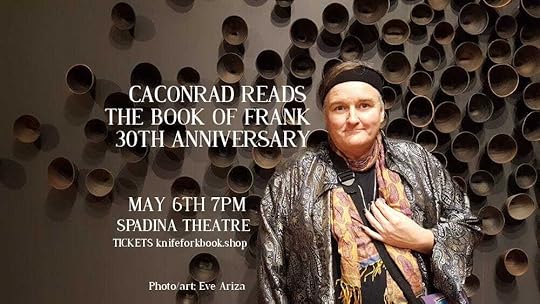
CACONRAD READS THE BOOK OF FRANK 30Th ANNIVERSARY CELEBRATION MAY 6 7PM SPADINA THEATRE ADV TKTS $20: knife | fork | book
The 2023 Writers Strike for Dummies, Vulture
Hot Writing Tips from Brandon Taylor
Another Story Bookshop May Events
10 Awful Truths about Book Publishing
Call for Poetry Submissions to Anthology - Woman, Life, Freedom: Iran, Editors: Bänoo Zan and Cy Strom
I just finished The Country Life (1999) by Rachel Cusk. It’s a strange and hilarious satire set in rural Sussex.
Does art about abuse need to make us comfortable? by Alicia Elliott, CBC
Sacha Archer “Four Sheets”
How Republican lawmakers are using custody threats to eliminate gender-affirming care for trans kids, Extra
Rabbits by David Lynch. Not sure how I stumbled on this, but it’s great!
Substack Recommendations The Shit No One Tells You About WritingThe biggest mistake new writers make and how to avoid it, the secret sauce to keep your readers turning the pagesHello and welcome! We’re so excited to share lots of writing and publishing goodies with you this month! Whether you’re just starting your first draft or are ten years and fifteen drafts deep, our aim is to share expert insight that will support and empower you on your writing journey. We want to make this newsletter as helpful to you as possible. Is th…Read more4 days ago · 9 likes · 2 comments · The Shit About Writing Team
The Shit No One Tells You About WritingThe biggest mistake new writers make and how to avoid it, the secret sauce to keep your readers turning the pagesHello and welcome! We’re so excited to share lots of writing and publishing goodies with you this month! Whether you’re just starting your first draft or are ten years and fifteen drafts deep, our aim is to share expert insight that will support and empower you on your writing journey. We want to make this newsletter as helpful to you as possible. Is th…Read more4 days ago · 9 likes · 2 comments · The Shit About Writing Team Memoir MondayFourteen Personal Essays to Remind You that You Are Human...Welcome to Memoir Monday—a weekly newsletter featuring the best personal essays from around the web, and a quarterly reading series, brought to you by Narratively, The Rumpus, Granta, Guernica, Oldster Magazine, Literary Hub, Orion Magazine, The Walrus…Read more8 days ago · Memoir Monday
Memoir MondayFourteen Personal Essays to Remind You that You Are Human...Welcome to Memoir Monday—a weekly newsletter featuring the best personal essays from around the web, and a quarterly reading series, brought to you by Narratively, The Rumpus, Granta, Guernica, Oldster Magazine, Literary Hub, Orion Magazine, The Walrus…Read more8 days ago · Memoir Monday Sitting in Silence Your Deathly Habits.“My poetry, I should think, has become the way of my giving out what music is within me.” – Countee Cullen I write today from the Word of South festival in Tallahassee, Florida. My performance was with Grammy winning guitarist Larry Mitchell and his band. It was my first time improvising spoken word with professional musicians and some moments felt posit…Read more7 days ago · 17 likes · 10 comments · Sitting in SilenceSupport Send My Love to Anyone
Sitting in Silence Your Deathly Habits.“My poetry, I should think, has become the way of my giving out what music is within me.” – Countee Cullen I write today from the Word of South festival in Tallahassee, Florida. My performance was with Grammy winning guitarist Larry Mitchell and his band. It was my first time improvising spoken word with professional musicians and some moments felt posit…Read more7 days ago · 17 likes · 10 comments · Sitting in SilenceSupport Send My Love to AnyoneThis newsletter is free, but you can support it by signing up for a monthly or yearly subscription, liking this post, or sharing it!
Big heartfelt thanks to all of the subscribers and contributors who make this project possible!
ConnectTwitter | Instagram | @themockler | Archive | Contributors | Subscribe
March 16, 2023
Send My Love to Anyone | Issue 25

Send My Love to Anyone is a reader-supported publication. To receive new posts and support my work, consider becoming a free or paid subscriber.
Hello friends and welcome to all the new subscribers!
Send My Love to Anyone is a free newsletter on all things writing by me and guests!
Paid subscribers have access to the archive. Check out our past contributors to see what we’ve been up to!
For Issue 25, Jen Sookfong Lee (author of Superfan: How Pop Culture Broke My Heart) writes about aging and possibility in “The Age Inside My Head.”
For their column The First Time, Kirby (author of Poetry Is Queer) reflects on loss, grief, joy, and how to live in “Things That Keep My Here.”
I share a story about the time everyone hated my award-winning haiku in “Kathryn Mockler’s Haiku Sucks” and for Words Count I write about an embarrassing writer thing that happened to me in public.
Issue 25 Gatherings includes recommended readings, films, workshops and more.
Congratulations to Send My Love contributor Francine Cunningham whose story collection God Isn’t Here Today was longlisted for the Carol Shields Prize for Fiction! Send My Love to Anyone published the story "Asleep Till You're Awake," from this collection in Issue 16.
Send My Love to Anyone is a reader-supported publication. To receive new posts and support this project, consider becoming a free or paid subscriber.
Issue #25 of Send My Love to AnyoneThe Age Inside My Head by Jen Sookfong Lee
Things That Keep Me Here by Kirby
Kathryn Mockler’s Haiku Sucks by Kathryn Mockler
It’s My Character by Kathryn Mockler
Sign up for Where Do I Start? | Writing Prompts & Resources by Kathryn Mockler
Support Send My Love to AnyoneThis newsletter is free, but you can support it by making a one-time payment to PayPal, signing up for a monthly or yearly subscription, or sharing it!
Big heartfelt thanks to all of the subscribers and contributors who make this project possible!
ConnectTwitter | Instagram | @themockler | Archive | Contributors | Subscribe
March 15, 2023
Things That Keep Me Here | The First Time
Don’t laugh, but she’s only realized now, about to officially become a senior, that she’s fabulous.
My mother died after nearly two years in isolation due to COVID-19 protocols, not in her 40+ years home full of memories, but in a new independent/assisted living unit in a Catholic senior’s facility on Five Points Road in the middle of nowhere, skirting what was once rural Northwest Ohio between the Maumee River and Bowling Green State University.
At the time, I had greeted her self-initiated move with praise, no small thing getting out from underneath that home in disrepair, preparation for these final years of living, everything looked after, everything done for her, activities galore, transportation to nearby strip malls and doctor’s appointments, even an old high school chum of mine working there she was friends with. A cross between a Holiday Inn and The Love Boat with a chapel (she had long since stopped going to church). In her typical fashion Suzanne, was gung-ho and mostly spoke glowingly of her new found amenities and life.
Even though I very rarely went down for family Christmas (not my holiday) I knew I simply had to make the exception that year, which was being held for the first time in a Community Room at her residence. And, yes, it was great to see everyone, okay not everyone, but the thing my mother lived most for was seeing all of her four kids in the same place with her, her home, hearing the banter and laughter of our familiar voices, that we still came together to be with her.
“Not all of my friends have this you know,” she would say, beaming, “Hell most of my friends, they're kids don’t even speak to them.”
“Yeah, Mom, we know,” having heard it so many times, but the fact that this mattered so much to her, meant the world.
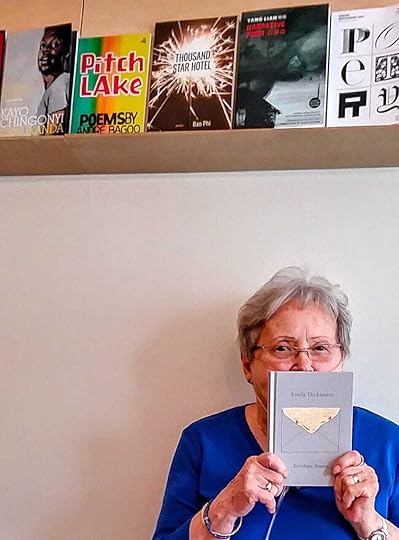 My mother, Suzanne, trying to hide her oxygen tube behind Emily Dickinson a rare visit from Ohio to knife | fork | book at Rick’s Cafe in Kensington Market.
My mother, Suzanne, trying to hide her oxygen tube behind Emily Dickinson a rare visit from Ohio to knife | fork | book at Rick’s Cafe in Kensington Market.Then it became the lost world.
The largest figure in my life, the mother who “kept me here,” gone.
Canada’s all-poetry shop, knife | fork | book, as a bricks and mortar place, a place held dear by poets across this country and elsewhere, gone. While KFB still fully functions as a small press and plays host to a yearly poetry festival, this was a devastating loss to any sense of community and cut short what was a Toronto landmark arts destination.
Any city life, any reason to even live in a city, gone.
Many go to places, gone.
Friends in isolation, replaced by screens.
My balcony, a.k.a. the gayest corner in the city, gateway to the Village, my only respite in the good months, a perch to view any signs of life, any familiar. My thankfulness that I even have this base (being put out onto the street is a real fear), my own assisted living that affords me shelter/home. The only thing that kept/keeps me from completely falling through the cracks. The only reason I’m still here.
That, and my touchstones, the very things of life itself, people, places, things, both dead and alive, real/imagined, intimates, beloveds, so deeply/physically connected form the webbing of a hammock between two pines on a single rock in Georgian Bay, or a chair on the porch of dear friends overlooking the Bay of Fundy, a dock where Neil and I hang our legs in the water, the immediacy of faces who shine, are radiant in return, even [especially when] masked.
My first four years in and out of hospitals—premature, underdeveloped lungs, mistaken for tuberculosis, cancer—I know the faces of masked nurses, my mother, tending, caring, keeping me here. Lifesavers.
On good days, any good day, I steered clear of the ever-present, constantly dark undertow … I’d see it, a few yards from me, just past the calm. You don’t play in undertow, it will fucking take you down.
What are good days? These days.
Good days are finding it. Your senses. What still reaches/touches you. Your awareness of such. A song. A taste. A refreshment. A landing (if your lucky). However ‘small.’ However momentary. Even if it’s just to ‘get up.’
The spaghetti and meatballs at Sugo. Making your way to see the new Kent Monkman at the ROM. Getting to your friend’s show. Picking up/returning library books. Creating new work sources for income. Returning messages, emails. Making a soup.
No. I don’t always want to. I didn’t want to most days. I didn’t want to be here. Live this life.
I live as a single person. Single people know. It can suck to have anything/everything that happens rest with you. No food in the house. Kitchen sink leaks. Run out of toilet paper, money. All on you, kid.
It’s a courageous act to continue. Helps to be self-amused. And my soups are delicious.
Hasn't one pandemic taking the lives of so many close to me been enough? Haven’t I fucking lived [through] long enough? FFS.
As Suzanne might say, “I’ve overstayed my welcome.”
A couple of things really made the difference.
Writing to/for someone.
Unexpectedly meeting someone new who reminded me of, matched my joy.
My book Poetry is Queer was supposed to come out in 2022, but my friend, poet/editor, Jim Johnstone wondered if I could complete it for an early date, and I said, “If I sit down to it.” That’s exactly what I did, mapping it out, placing writings in a shared folder weekly for a year until it was done (Pub date, Oct 2021).
I’m good with deadlines. I love sitting down to something.
But, what really helped me, in this particular instance, was having someone to write to/for.
Having immigrated from the States [Reagan got elected, I met a boy, “America. Love it or Leave It”], my love/hate relationship remains to this day, and what I see happening there now is increasingly horrifying. Yes, there’s much wrong/harm injustice to be tended to/fully addressed here, and the banning of books, curriculum, deliberate erasure of history/facts, full-on attacks of oppressed peoples bodies/beings, capitalism at the cost of multitudes, the very same evil authorities of church and state that willfully kill, call for the murder of anything other.
It’s tough to be a girl, a queer, a trans, a woman, a bipoc, hell, it’s even fucked for the gay-friendly.
As a young’n, I voraciously combed libraries, galleries, theatres in search of anything remotely gay, a treasure hunt, to imagine/construct any queer life at all in this hateful world. Gide. Genet. Isherwood. Tennessee. Baldwin. Duberman. Camus. Most arrested, all criminals at the time, many in therapies with promises of cures, many married at one point with children, some momentarily praised, mostly reviled, fears of losing jobs or not getting promoted, queer artists always scrounging for money, a place to live, the reasons it was called, “the love that dare not speak it’s name”… to “Don’t Ask, Don’t Tell,” to “shut the fuck up already!”
Not on your life.
In PIQ, I set out to write a sort of queer survival map, “this way kids, here’s who I read, this gave me some breathing space, joy.”
Moving the plants in off my balcony at season’s end this past year was physically more then I should have. O, she did it, she’s a Taurus, but I’m not aging well [which simply means, she’s aging] and wintering even less. Sunless, dark days a plenty, her balcony cold, the projection of new variants, no mother to call Sundays. Any day. I don’t share these things as a rule, nor lightly.
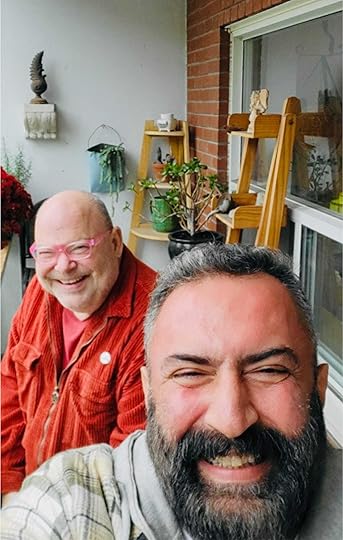 Amir & me. Perched on the balcony.
Amir & me. Perched on the balcony.Wait, there’s number 2. Meeting someone new.
Which opened the door, made me meet myself anew.
Probably the most exceedingly rare thing in this life has been finding someone, actually, a queer sister, to match my joy. They’re few, less than a handful, a couple still with me.
That person you don’t have to explain fuck-all to.
They simply get it. You.
I pray to the cockgods each and everyone meets someone in kind/ness.
Amir is a 6’5” Iranian queer who fills my doorframe. When he first stepped into my place, I said, “Whoa, there’s a man in my house,” to which he replied, “How do you know?”
“Girl! Get your ass in here! Let me fix you a gay cocktail!”
Our meeting was so unexpectedly sweet, at first I thought it might be a romance, and while I’m not keen on the term ‘bromance,’ let’s simply say our glowing affections for each other are on equally grand display. ‘Mensches,’ ‘babooshkas,’ more accurately apply.
I honestly don’t know exactly how these things happen, I’m simply in awe, overjoyed when/that they do.
We cook for each other. Go to Costco (he drives, teaches others how to drive, has a car!). We point to boys we think the other would have eyes for. Dance our tits off, “This song is THE BEST EV-VAH!”
A defibrillator may do something similar, revive. But, I’d rather it be Amir.
Then there was the unexpected pleasure of returning to my own work.
Wintering, no salary to speak of, still trying to get out from under the debt incurred by business [or lack thereof] during sporadic waves of Covid. Monies lost trying to keep KFB afloat as a poetry shop. I always said we didn’t need much in the way of income [meaning, she mostly made ends meet], but I couldn’t afford to continue to lose money I didn’t have. Grants, a long shot [LGBTQ category dropped off art councils primary candidates list, yeah, like that makes fucking sense]. What the fuck is she gonna do?
“She’s a Professional Homosexual …
PUT ON A SHOW!”
The more readings I gave of Poetry is Queer, the more she realized it was ripe for a one-person show. Though my KFB launch for This Is Where I Get Off was decidedly staged/theatrical, I hadn’t performed in a theatre since the early 90s, a monologue titled, [wait for it], Why We Must Live at Buddies in Bad Times before they moved down the street from me on Alexander.
Little did I know, adapting PIQ into a 90-minute staged reading would [once again] save, change my life.
As a writer, you most often hear of the experience of returning to previously published work only to find it lacking—the things you would change, the embarrassment of this being out there at all. Everyone thinks the work they’re currently working on is their best work, [this btw, is my best EV-VAH] otherwise you wouldn’t commit to it.
Actually, that’s not entirely accurate. I despise the ‘preset’ of this has to be ‘my best’. What a boner-killer.
The will to do something entirely different. Beyond success and failure. To fuck it up. Make a mess of it. A spectacular in bold technicolour splendour replete with a 70’s moaning porn soundtrack on vinyl.
Having written much of PIQ early/throughout the pandemic, I can honestly say it wasn’t until I returned to it that I began to see exactly what I had written. I’m not referring to the text itself, which was all too familiar, but the book, the clarity of its power, strength as a queer manifesto, a map, a guide, but also a call to arms. That unlike some would like to have us think, “it [CLEARLY DOESN’T] get better.”
Fuck that. It’s time to gird your loins and read your queer elders who have lived through way more shit than most.
Find out how. Not only how to survive, though that’s a vital step, but how to LIVE.
This became grist for the mill fashioning PIQ into the staged reading now called, Behold. The throughline, how anyone, particularly queers, find light in the darkness. Light the darkness itself.
But, first it helps to notice the light, the darkness, being here.
Don’t laugh, but she’s only realized now, about to officially become a senior, that she’s fabulous.
And, tonight’s in house performance is SOLD OUT!
Ain’t no stopping her now. No siree bob.
Even though I’m sick to death of my life this Monday morning, when in actuality, she’s simply done with winter, I did make my way to the library and back. And, she finished this column.
Suzanne smiles.
Thank you for reading Send My Love to Anyone. This post is public so feel free to share it.
Kirby’s Poetry Is Queer is out now from Palimpsest Press.
"Let's have a gay moment, shall we?"
BOOKING INFO TO BRING KIRBY TO YOUR LIVING ROOM OR SMALL VENUR.
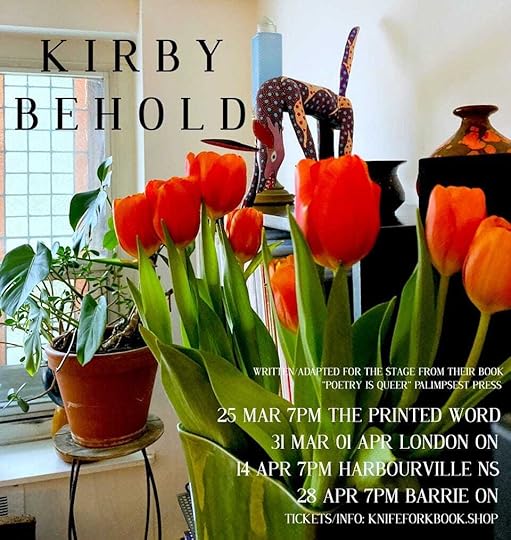
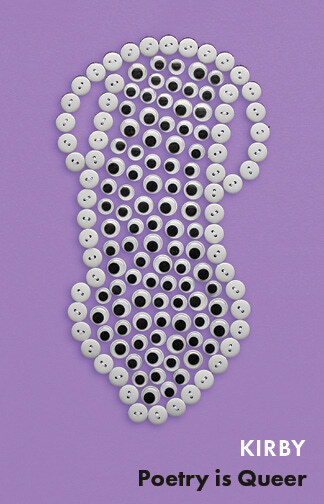 Poetry is QueerKirby Palimpsest Press, 2021
Poetry is QueerKirby Palimpsest Press, 2021Poetry is Queer is a kaleidoscope of sexual outlaws, gay icons, Sapphic poets, and great lovers.
Support Send My Love to AnyoneThis newsletter is free, but you can support it by making a one-time payment to PayPal or by signing up for a monthly or yearly subscription.
Big heartfelt thanks to all of the paying subscribers who help make this project possible!
Donated funds go to paying guest authors and maintaining the newsletter.
ConnectTwitter | Instagram | @themockler | Archive | Questions | Subscribe
March 11, 2023
Jen Sookfong Lee | Issue 25
That freshness I craved, that I was always rushing toward, was really about one crucial thing: possibility. —Jen Sookfong Lee
This year, I turn 47.
Twenty years ago, I was writing The End of East and querying agents (by mail, I should add, with self-addressed stamped envelopes for the almost certain return of my manuscript). I was drinking dark beer that tasted like room temperature stew in a misguided attempt to seem like the kind of cool white girl who knew which porter came from Ireland and which sad, tortured band had covered that Johnny Cash song I had never heard of. Twenty years ago, I was 27, the age I have been inside my head for most of my life.
It's a cliché that your 20s are full of discomfort and change, full of ambition and failure, love and heartbreak, and it’s true. By the time I was 27, I had moved across the country to start school, moved back across the country when I dropped out of school, got married, and worked many, many jobs, including a brief summer contract as a publicist for one of the Harry Potter books, sitting at a desk beside the eye-flushing station in the first aid room because the regular office was too crowded. The change was monumental. The speed was breakneck. But I revelled in it. I sought out change, running in different directions if I felt like it, if the air grew stagnant, if I woke up and thought, Well, this is boring. You can ask my mother. She describes my younger personality with a Toisan term that translates literally as “tough-necked,” or so determined to make things happen that you tense your neck and just forge ahead, impervious to anyone else’s opinion.
That freshness I craved, that I was always rushing toward, was really about one crucial thing: possibility. My 20s were the setting for change, but that change was precipitated by the feeling that there could be something more, something better, maybe even the thing I had been wishing for my entire life. Back then, what I wanted was to write a book and have it published, be interviewed on CBC Radio, and stand up in front of a room of readers and have them listen to my words. If I made seemingly nonsensical decisions—like working three part-time, shitty ass jobs so I could have Fridays off to write—it was all in service of a dream, almost always this particular authorly dream.
I wanted other things too: children, a dog, a house with a yard, a home office lined with bookshelves, a reputation as a cool, cultural girl who could rattle off the titles of French New Wave movies while also providing biting commentary on what Paris Hilton was doing. But there was nothing as persistent or motivating as wanting to be an author.
People in midlife love to say they would never wish to be their 20s again. This is a partial lie, designed to make us feel better about our smile lines, the stains on our teeth from all of those years of smoking cigarettes in alleys, the ache in our hands from the slowly advancing arthritis. It could be true that the pace of our 20s seems incomprehensible and unsustainable to us as we age. There is no way I could write until three in the morning now and still have the energy to fall in love and look for a better job. And I wouldn’t want any of that again anyway. But I wish I could walk out my front door and breathe in the scent of possibility, follow the trail of what could be, heart beating fast, eyes wide open for any small sign that meant I was getting there, wherever there was. There is magic in those moments when the next five minutes or the next five years are totally unknown and therefore potentially beautiful or productive or transcendent.
So, in my 47th year, with an inner 27-year-old inside of me, I am making the resolution to make space for that unstructured wonder. It’s true that I own my own little townhouse now, that I am a parent, and that I am the author I had always wished I could be, but it’s also true that possibility is still an option as I move into my 50s and 60s and beyond. I could change direction at any time, which could mean taking a new route when I walk the dog, or selling all my shit and driving aimlessly in a motor home. It could be all of that, or none of it.
So, in a couple of decades, if you see me in tracksuit and a fanny pack, standing at the crest of a hill, eyes closed while I sniff the air, just know that I’m still 27 inside and waiting for possibility.
Thank you for reading Send My Love to Anyone. This post is public so feel free to share it.
Jen Sookfong Lee was born and raised in Vancouver’s East Side, and she now lives with her family in North Burnaby. Her books include the recently published memoir Superfan: How Pop Culture Broke My Heart (January 2023, McClelland & Stewart, North America), The Conjoined: A Novel (ECW 2016) nominated for International Dublin Literary Award and a finalist for the Ethel Wilson Fiction Prize, The Better Mother, a finalist for the City of Vancouver Book Award, The End of East, The Shadow List, and Finding Home. Jen was, for many years, an instructor for Simon Fraser University’s The Writers’ Studio as well as a familiar voice on CBC Radio, and now acquires for ECW Press and co-hosts the literary podcast, Can’t Lit.
Jen Sookfong Lee will be at the FOLD (April 30-May 27)
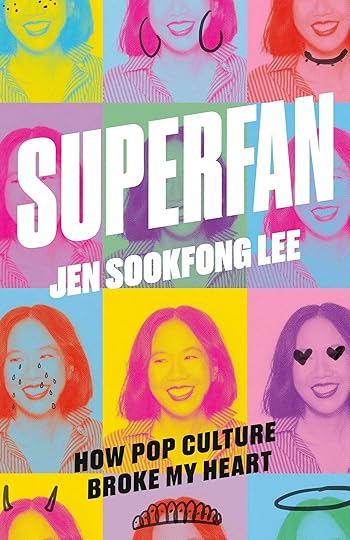 Superfan: How Pop Culture Broke My Heartby Jen Sookfong LeePenguin Random House, 2023
Superfan: How Pop Culture Broke My Heartby Jen Sookfong LeePenguin Random House, 2023A TODAY Show Recommended Read, this beautifully intimate memoir-in-pieces uses one woman's life-long love affair with pop culture as a revelatory lens to explore family, identity, belonging, grief, and the power of female rage. Named a most anticipated book of the year by the Globe and Mail and the Toronto Star.
For most of Jen Sookfong Lee's life, pop culture was an escape from family tragedy and a means of fitting in with the larger culture around her. Anne of Green Gables promised her that, despite losing her father at the age of twelve, one day she might still have the loving family of her dreams. Princess Diana was proof that maybe there was more to being a good girl after all. And yet as Jen grew up, she began to recognize the ways in which pop culture was not made for someone like her—the child of Chinese immigrant parents who looked for safety in the invisibility afforded by embracing model minority myths.
Ranging from the unattainable perfection of Gwyneth Paltrow and the father-figure familiarity of Bob Ross, to the long shadow cast by The Joy Luck Club and the life lessons she has learned from Rihanna, Jen weaves together key moments in pop culture with stories of her own failings, longings, and struggles as she navigates the minefields that come with carving her own path as an Asian woman, single mother, and writer. And with great wit, bracing honesty, and a deep appreciation for the ways culture shapes us, she draws direct lines between the spectacle of the popular, the intimacy of our personal bonds, and the social foundations of our collective obsessions.
Send My Love to Anyone is a reader-supported publication. To receive new posts and support this project, consider becoming a free or paid subscriber.
Support Send My Love to AnyoneThis newsletter is free, but you can support it by making a one-time payment to PayPal, signing up for a monthly or yearly subscription (which gives you access to the full archive) and liking or sharing it!
Big heartfelt thanks to all of the subscribers and contributors who make this project possible!
ConnectTwitter | Instagram | @themockler | Archive | Contributors | Subscribe
March 8, 2023
Kathryn Mockler's "Haiku Sucks" | Issue 25
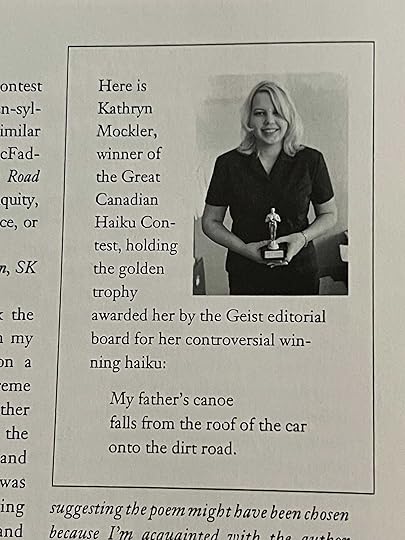 Geist, Issue No. 26
Geist, Issue No. 26I felt I was undeserving of the honour, and, as it turned out, so did everyone else!
In 1997, early in my writing life when I had a couple of small literary publications under my belt and was an MFA student at UBC, I entered Geist Magazine’s Great Canadian Haiku Contest, which was judged by poet David McFadden.
Much to my surprise, I won.
Send My Love to Anyone is a reader-supported publication. To receive new posts and support this project, consider becoming a free or paid subscriber.
The prize consisted of a “specially engraved Great Canadian Haiku Trophy” and a cash award of $5 per syllable. In the issue my award was announced (No. 25), my haiku appeared alongside several honourable mentions.
In his judge’s note, David McFadden explains that adjudicating this contest was “no piece of cake” and that “there wasn’t one truly bad-bad haiku in the bunch” (No. 25) except one poem which was disqualified for picturing [a well-known Canadian personality] as a pedophile."1
McFadden then explained why my poem was chosen:
As for the winner, it was was chosen because of the electrical effect created by the friction between the dramatic power of the event and the hilariously understated expression of it—and all the invisible ripples of guilt, snickering, open laughter, disbelief, wondering how much the repair bill will be, will the insurance cover it, etc. Truly a powerful moment suspended in time—we don’t even know if the event is occurring before going to the lake or on the way back.
Wow! No one had ever written anything so profound about my writing before. I felt I was undeserving of the honour, and, as it turned out, so did everyone else! The Geist readers hated my poem and were not shy about expressing it.
Readers felt that Gary Barwin, a writer who would later become my friend and collaborator, had been robbed of the award. Barwin coined the contest’s title in his entry “Haiku Night in Canada,” but unfortunately his poem was disqualified because of an extra syllable. Without that syllable, the award likely would have been his.
old pond hipchecked by froghaiku night in Canadathe shriek of frond bladesAnd Gary should not have been disqualified because the 5-7-5 rule in English is arbitrary.2
In Issue 28, Naomi Wakan, pointed this out as well in a somewhat neutral yet informative letter. She describes the essence of the haiku not in terms of the five, seven, five framework, or nature as a subject.
The essence is rather a recording of what the senses register in one moment. That moment is the present, so haiku is written in the present tense and consists mostly of nouns. The poet is arrested by sensations and images to the point of gasping in amazement. Not the ‘wow’ kind of amazement, but the amazement resulting when the inner and outer, the micro and the macro, the higher and the lower, or other dichotomies converge into the ‘whole world’ in a ‘grain of sand’ moment.” —Naomi Wakan
It was amusing to me that I had won — especially since I had whipped off the haiku without much thought. I had zero interest in the nationalism or the Canadiana bent of the contest, but entered as a lark and because I enjoyed haiku as a form.
My poem was based on a story my father had told me about a time his canoe fell off the roof of his car when he was driving along a bumpy dirt road. I wasn’t even with him but thought it was a funny anecdote that I could clearly picture in my mind, so I wrote about it in haiku form!
However, I soon became aware that a controversy was brewing about my win. Having my poem published alongside the runners up, gave readers an opportunity to be their own judge. Numerous Geist readers felt I should not have won the Great Canadian Haiku Contest at all, and for the next three or four issues, wrote in angry letters to the editor about me and my poem and sometimes even penning their own.
In Issue No 27, Rick Patrick wrote of my haiku: “Are you [expletive deleted] kidding? I’d rather read about [insert well-known Canadian personality] as a pedophile,” and after mocking the judge’s take on the haiku, Patrick threatens that if my poem is “the stuff CanLit” then he’s moving to “the States. (Check that: maybe England or France. Somewhere far away.)”.
Some readers felt I should be disqualified because I didn’t put winter in the poem. Others thought that my poem wasn’t “Canadian” enough. One reader wrote:
Cut the crap … the winning haiku sucks. It’s Gary Barwin who gave you the 'wonderful tribute to Basho’s memory,' as well as your title, and he ought to have won the prize … Hell, if I’d known season didn’t count I could have come up with a 'sudden illumination' more exciting than the contest winner. How about this:
yellow fountain sprayson his back, having a fitmy old cat pisses—Anne Miles
In another letter, reader Judy Jenkins speculated that I purposely wrote the image of the car and canoe in order to win David McFadden’s favour because the first edition of McFadden’s 1978 book On the Road Again (McClelland & Stewart) has an image of a vehicle driving down a country road with a canoe attached to its roof. “Is this coincidence, propinquity, synchronicity, harmonic convergence, or you name it?” Jenkins asks.
While the cover image does look incriminating, I had never seen this book until Geist published a photo of it the Letters section.
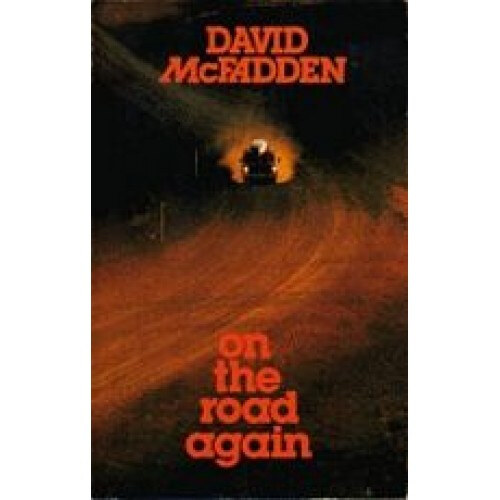
The negative responses caused McFadden to fire back a satirical response making up his own salacious gossip about the readers, their speculations, and their relationships to him and each other, which, in turn, caused more controversy, and Geist had to issue a retraction and apology in Issue No. 27.
The only reader with something positive to say (bless his heart!) was Brad Devlin (No. 26) who wrote, “The winning haiku brought back the memory of a canoe incident from my childhood.” He then shared his own story of a canoe falling from his family’s car and ends his letter with “Great haiku.”
That I could inspire so much hate and conspiracies about a poem I wrote confused me. I remember opening each new issue of the magazine to see if there was yet another hate letter and the Letters section did not disappoint.
I failed to realize at the time that I hadn’t just entered a haiku contest (as I saw it) but rather I had dared to submit to a national identity contest. Not only had I butchered the haiku form, of which Geist readers had considered themselves experts, but also I had failed to provide an acceptable representation of Canada. So the only reasonable conclusion for my win was that I cheated or in some way compromised myself with the judge.
CBC Radio contacted me by phone for a comment about the controversy and I remember feeling like the interview was condescending with questions like, “Will you ever write another poem again?” I think my answers were pretty boring because I didn’t care that everyone hated the haiku, so I’m not even sure the interview ever aired.
Somehow the Utne Reader caught wind of it too and published my and Gary’s poems side by side. Perhaps they thought the controversy was quaint or hoped to capitalize on the Canadian poetry rage, but alas, American readers were not too interested in this drama, and the controversy was finally laid to rest.
I asked Gary if he remembers the Great Canadian Haiku contest that he almost won, and he doesn’t remember more about this “haikulabaloo” except an unrelated anecdote:
After this, unrelatedly, CBC’s Here and Now drive-home show in Toronto used “Haiku Night in Canada,” as a title for a contest that they hosted and I contacted them to tell them it was my title. They still used it but had me on to read my poems (I have a suite of poems in my Outside the Hat book called that) and to talk about haiku.
I love stories of interactions before writers knew each other — we both were in our early careers — I had no idea that this was you — we didn’t know each other then. I do wish I had had the presence of mind to write to you and Geist about this — it seems ridiculous but also hurtful and unfair.
‘Haiku Matata, everyone. No worries, chill out. Kathryn's poem abides by the rules and is lovely. No reason to be nasty or outraged. There are actual people behind these poems. And one should always be nice to people, especially Kathryn who’ll become a dear friend of mine later on.’
—Gary Barwin
Geist offered both David McFadden and I a chance to respond in the Letters section. I declined, a little weary of my 15-minutes of fame, but McFadden used the opportunity to refute the rumours that we knew each other.
He wrote, “If you are suggesting that the poem might have been chosen because I’m acquainted with the author you’ve got the wrong guy.” And in saying a little more than he “originally wished to about the prize-winning entry,” McFadden once again defended his support of the poem claiming it was “a brilliant update of Basho’s famous frog poem … the road = the pond, the car = the lily pad, the canoe = the frog. Plop!” (No. 26).
After the contest, I acquainted myself with David McFadden’s work, and I cherished his poetry for its combination of humour, bleakness, and heart. I wish I had gotten the chance to meet him in person, but I never did. Sadly David McFadden passed away in 2018.
If you’re looking for a place to start with his work, I recommend Why Are You So Sad? Selected Poems, Selected and Edited by Stuart Ross in 2007.
Thanks to Geist Magazine for sending me all the back issues so I could write this piece!
Thank you for reading Send My Love to Anyone. This post is public so feel free to share it.
Kathryn Mockler’s debut story collections Anecdotes is forthcoming from Book*hug. Pre-order Anecdotes at your local bookstore.
 Support Send My Love to Anyone
Support Send My Love to AnyoneThis newsletter is free, but you can support it by making a one-time payment to PayPal, signing up for a monthly or yearly subscription, or sharing it!
Big heartfelt thanks to all of the subscribers and contributors who make this project possible!
ConnectTwitter | Instagram | @themockler | Archive | Contributors | Subscribe
1Note: [insert name of Canadian personality] is my addition. In Issue 27, Geist editors published the name of the personality, but I have chosen to not include it in this essay.
2“No 5-7-5” by Michael Dylan Welch National Haiku Writing Month https://www.nahaiwrimo.com/why-no-5-7-5
March 7, 2023
It's My Character! | Words Count

Recently I had a very EMBARRASSING writer thing happen to me in public!
Part of my writing process is to go for long walks and listen to audiobooks. Often I will listen to craft books and sometimes partake in the writing exercises especially if it is something I want to try out with my students.
On this particular day, I was reading The 90-day Novel by Alan Watt. It has great stream-of-consciousness exercises, so I thought I would use my voice-to-text app and do the exercises while I was walking.
I was cutting through Camosun College which has a narrow paved path with grass on either side. The grassy area was empty, so it felt like I was alone.
The prompt I chose involved writing for five minutes about something no one knew about your character that wouldn’t be apparent by looking at them.
In a particularly uninspired moment, I decided that my character would have low self-esteem even though she seemed confident.
In first person point of view (so I could really get into the character), I said into my notes app, “I hate myself.”
But the app wasn’t dictating correctly, and I had to repeat the phrase again, but it still wasn't correctly dictating. I quickly became annoyed at the app and began yelling into my phone the way I do when I’m mad at Siri, “I hate myself. I hate myself. I hate myself," I repeated. Each time I said it, I got louder and louder.
I was wearing noise cancelling headphones and couldn’t hear my surroundings, but it suddenly occurred to me that someone might be behind me on the path, so I turned around and sure enough there was a person directly behind me.
They looked away when I caught their eye like some private moment of mine had been invaded. Mortified, I jumped off the path so they could pass and discovered four other people right behind them.
Dying inside, I pretended to busy myself with my phone while the line of people continued along the path.
I wanted to yell, “It’s my character. I'm a writer! I don’t hate myself!”
 Support Send My Love to Anyone
Support Send My Love to AnyoneThis newsletter is free, but you can support it by signing up for a monthly or yearly subscription, liking this post, or sharing it!
Big heartfelt thanks to all of the subscribers and contributors who make this project possible!
ConnectTwitter | Instagram | @themockler | Archive | Contributors | Subscribe



